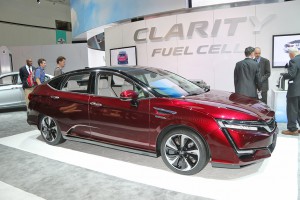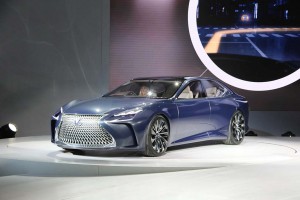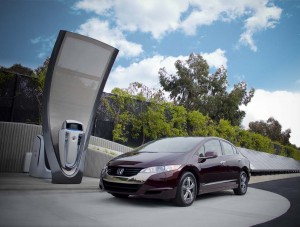
Honda revealed its Clarity fuel-cell vehicle in LA, and will put it into production later this year.
(This story has been updated with a comment from GM.)
General Motors and Honda may partner on a new fuel cell plant in a bid to bring a promising, clean alternative to battery-electric vehicles to market, according to a news report from Japan.
The two automakers already have established a joint venture aimed at developing advanced fuel cell technology, but the new measure would take things a critical next step, helping put their research into production.
Honda is set to become the third major automaker to begin retailing a hydrogen-powered vehicle with the planned introduction, later this year, of its Clarity FCX. Hyundai introduced its Tucson Fuel Cell Vehicle in 2014 and Toyota launched its Mirai model last year. GM has not yet marketed a production model.
All three models currently are offered in only limited markets due to the lack of a hydrogen production and distribution infrastructure. But proponents believe that as more fuel-cell vehicles come to market energy companies will be more willing to expand availability of the clean fuel – which, in turn, would encourage more consumers to buy the vehicles.
Fuel cell vehicles use a “stack,” a device that brings the lightweight gas together with oxygen from the air. That, in turn, creates water vapor and a stream of electrons that can power the same sort of electric drivetrain found in a battery-electric vehicle.
In fact, some experts refer to a fuel-cell as a “refillable battery,” because a motorist can typically fill up a hydrogen tank in as little as four to five minutes. That’s something manufacturers like Honda and Toyota like to highlight as it provides a distinct advantage over the long charging times required for a regular battery vehicle. The current crop of hydrogen cars also deliver as much as 300 miles range, significantly more than most battery-electric vehicles.
(Click Here for more on Audi’s h-tron Quattro hydrogen concept.)
Hydrogen technology has improved significantly in recent years, fuel-cell stacks becoming smaller, lighter, more powerful – and less expensive. But the technology is still in its early stages, according to most experts, and development costs are steep.
That has led a number of carmakers to partner up to share those costs. Toyota, for one, is working with BMW. Daimler is allied with Nissan, as well as Ford. And Honda and GM have been collaborating since 2013.
As with a number of other auto industry research consortia, the two makers have focused on advanced development, going it on when it comes closer to the production stage. But they know may be willing to work together at another level, according to the report by Japan’s Asahi Shimbun.
If the report is accurate, they would set up a plant to product fuel cell systems for both manufacturers. There could still be significant differences in the vehicles they eventually bring to market, including hardware systems like their controllers and motor drives. And they would almost certainly use different software to give those vehicles distinctive ride and performance characteristics, according to industry experts.
The two partners would like to begin mass production of fuel-cell vehicles by 2025, according to the report. That would not, apparently, preclude them from producing their own models individually before then.
Asked about the Asahi Shimbun report, a spokesman for the Detroit maker said, “GM and Honda have previously announced a joint development agreement for fuel cell systems for future vehicle programs. We will not comment on rumors or speculation on our ongoing collaboration.”
Supporters hail fuel-cell vehicles as the true wave of the future, a technology that can overcome the problems of battery power. Among the most vocal proponents, Toyota is looking at expanding its range of offerings beyond the new Mirai. The Japanese giant showed off its Lexus LF-LC concept model at the North American International Auto Show last week, and said it could see production by decade’s end.
(Click Here to check out the Lexus LF-LC concept.)
To help solve the chicken-and-egg problem, California lawmakers have set aside funds to establish 100 hydrogen fueling stations around the state. Similar projects have been launched in Germany and Japan.
But not everyone is so sanguine. Elon Musk, the founder and CEO of battery-carmaker Tesla Motors, derides the technology as “fool cells,” and critics contend that hydrogen power will eventually lose out to battery technology.
(NHTSA forms consortium with 18 automakers to rush new safety technology to market. Click Here for more.)



I don’t think U.S. tax payers planned on GM spending our money to create jobs in CHINA when we loaned GM money to stay in business. This is the same GM who KILLED over 100+ people and has gotten a Free Pass by the media and almost the same from the siren chasers.
As far as Elon Musk’s POV on fuel cells, not only is he bias and wrong his three businesses are all underwritten by U.S. tax payer money that the Obama administration doled out to him. SpaceX proceeded to launch another satellite that returned to a landing platform in the ocean today where it landed, fell over and exploded – again. Those are millions of U.S. tax dollars going up in flames every time SpaceX blows up another one.
This is the same Elon Musk who loses $4K on every Tesla model S sold. This is the same Tesla who’s model S has so many defects that Consumer’s Report retracted their praise of Tesla’s model S which was suppose to get Tesla into the “black”. Tesla is 2 years late on the third attempt at a EV that will make the company profitable.
Wow! GT 101, jorge m, Who’s really biased? You are! I see your still upset about Santa Claus giving you the lump of coal for defending VW about diesels. How soon you seem to forget. Lol.
DWH-
You keep getting schooled by myself and Paul when you try to shill for Tesla and increase the return on your Tesla stock. You don’t seem to be able to handle the reality that Tesla loses $4K on every S model sold and that Consumer’s Report has pulled it’s previous good review of the S model because the production models have so many defects.
Paul even had to school you on hydrogen fuel cell powered vehicles. Thankfully for the few who want an EV, hydrogen fuel cell powered vehicles give consumer’s a viable choice instead of an impractical, over-priced, unreliable battery powered EV being pimped by shills looking to cash in on gullible consumers who might buy a battery powered EV.
DENIAL is NOT going to change reality so you can give up the shilling to raise your Tesla stock price.
You just keep chanting: “The earth is flat, the earth is flat” and see if it changes reality. As a lifetime member of the flat earth society you must not get out much because you’re afraid to fall off the edge of the earth…